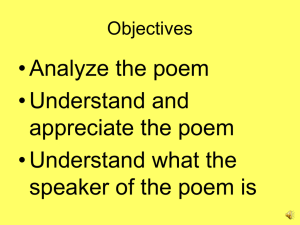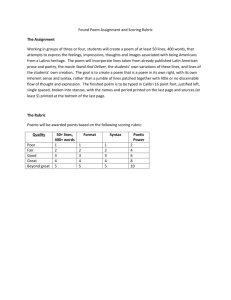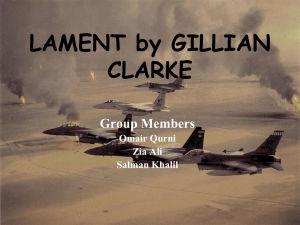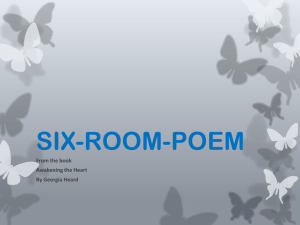poetry-over-spring
advertisement
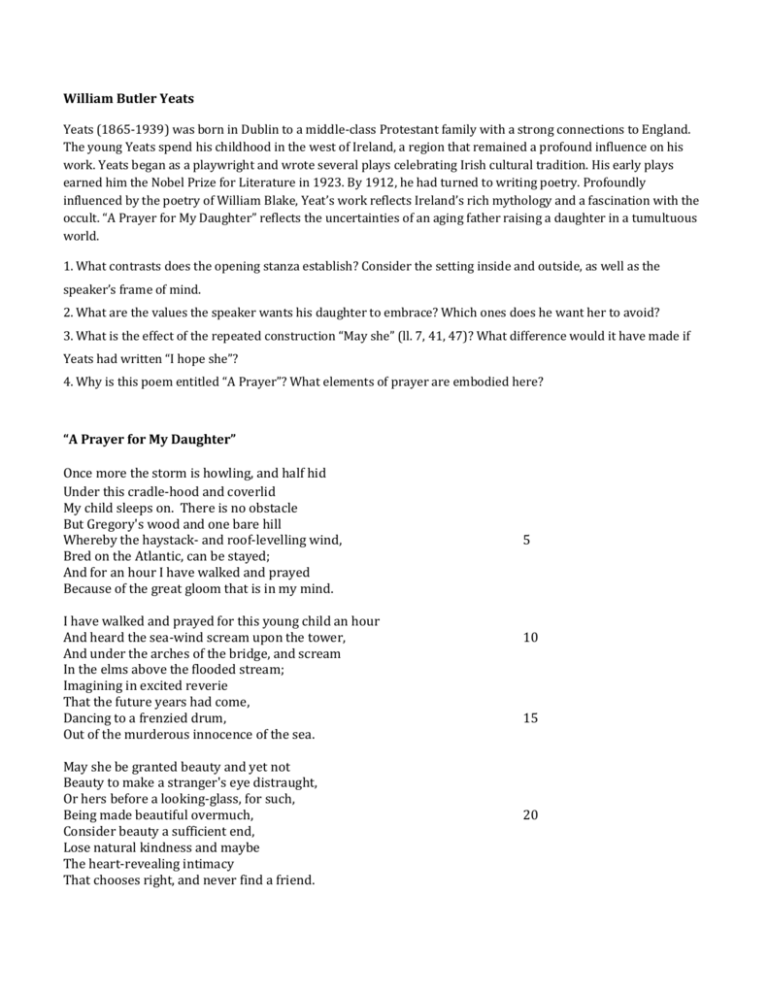
William Butler Yeats Yeats (1865-1939) was born in Dublin to a middle-class Protestant family with a strong connections to England. The young Yeats spend his childhood in the west of Ireland, a region that remained a profound influence on his work. Yeats began as a playwright and wrote several plays celebrating Irish cultural tradition. His early plays earned him the Nobel Prize for Literature in 1923. By 1912, he had turned to writing poetry. Profoundly influenced by the poetry of William Blake, Yeat’s work reflects Ireland’s rich mythology and a fascination with the occult. “A Prayer for My Daughter” reflects the uncertainties of an aging father raising a daughter in a tumultuous world. 1. What contrasts does the opening stanza establish? Consider the setting inside and outside, as well as the speaker’s frame of mind. 2. What are the values the speaker wants his daughter to embrace? Which ones does he want her to avoid? 3. What is the effect of the repeated construction “May she” (ll. 7, 41, 47)? What difference would it have made if Yeats had written “I hope she”? 4. Why is this poem entitled “A Prayer”? What elements of prayer are embodied here? “A Prayer for My Daughter” Once more the storm is howling, and half hid Under this cradle-hood and coverlid My child sleeps on. There is no obstacle But Gregory's wood and one bare hill Whereby the haystack- and roof-levelling wind, Bred on the Atlantic, can be stayed; And for an hour I have walked and prayed Because of the great gloom that is in my mind. I have walked and prayed for this young child an hour And heard the sea-wind scream upon the tower, And under the arches of the bridge, and scream In the elms above the flooded stream; Imagining in excited reverie That the future years had come, Dancing to a frenzied drum, Out of the murderous innocence of the sea. May she be granted beauty and yet not Beauty to make a stranger's eye distraught, Or hers before a looking-glass, for such, Being made beautiful overmuch, Consider beauty a sufficient end, Lose natural kindness and maybe The heart-revealing intimacy That chooses right, and never find a friend. 5 10 15 20 Helen being chosen found life flat and dull And later had much trouble from a fool, While that great Queen, that rose out of the spray, Being fatherless could have her way Yet chose a bandy-leggèd smith for man. It's certain that fine women eat A crazy salad with their meat Whereby the Horn of Plenty is undone. In courtesy I'd have her chiefly learned; Hearts are not had as a gift but hearts are earned By those that are not entirely beautiful; Yet many, that have played the fool For beauty's very self, has charm made wise, And many a poor man that has roved, Loved and thought himself beloved, From a glad kindness cannot take his eyes. May she become a flourishing hidden tree That all her thoughts may like the linnet be, And have no business but dispensing round Their magnanimities of sound, Nor but in merriment begin a chase, Nor but in merriment a quarrel. O may she live like some green laurel Rooted in one dear perpetual place. My mind, because the minds that I have loved, The sort of beauty that I have approved, Prosper but little, has dried up of late, Yet knows that to be choked with hate May well be of all evil chances chief. If there's no hatred in a mind Assault and battery of the wind Can never tear the linnet from the leaf. An intellectual hatred is the worst, So let her think opinions are accursed. Have I not seen the loveliest woman born Out of the mouth of Plenty's horn, Because of her opinionated mind Barter that horn and every good By quiet natures understood For an old bellows full of angry wind? Considering that, all hatred driven hence, The soul recovers radical innocence And learns at last that it is self-delighting, Self-appeasing, self-affrighting, And that its own sweet will is Heaven's will; 25 30 35 40 45 50 55 60 65 She can, though every face should scowl And every windy quarter howl Or every bellows burst, be happy still. And may her bridegroom bring her to a house Where all's accustomed, ceremonious; For arrogance and hatred are the wares Peddled in the thoroughfares. How but in custom and in ceremony Are innocence and beauty born? Ceremony's a name for the rich horn, And custom for the spreading laurel tree. 70 75 80 Langston Hughes Langston Hughes (1902-1967) grew up in the African American community of Joplin, Missouri. He spent a year at Columbia University and became involved with the Harlem movement, but was shocked by the endemic racial prejudice at the university and subsequently left. Hughes traveled for several years, spending time in Paris before returning to the U.S. He completed his BA at Pennsylvania’s Lincoln University in 1929, after which he returned to Harlem for the remainder of his life. Hughes’ output was prolific in verse, prose, and drama. His first volume of poetry, The Weary Blues, was published in 1926. This collection contained “The Negro Speaks of Rivers” perhaps his most famous poem. His first novel, Not Without Laughter (1930), won the Harmon Gold Medal for literature. He is remembered for his celebration of the uniqueness of African American culture, which found expression in “The Negro Artist and the Racial Mountain” (1926), published in the Nation, and in the poem, “My People.” He also wrote children’s poetry, musicals, and opera. This poem, “Mother to Son,” expresses a mother’s advice to her son with its famous refrain, “Life for me ain’t been no crystal stair.” 1. What is the overall message the mother is trying to convey to her son? 2. Based on the details in the poem, how would you characterize the mother? 3. How old is the son being addressed? Does he seem to be at some sort of crossroads? Cite specific textual evidence to support your viewpoint. 4. Even though the poem is presented without stanza breaks, there are “turns,” or shifts. What are they? Try reciting the poem; where would you emphasize pauses? How do these breaks influence or emphasize meaning? “Mother to Son” Well, son, I’ll tell you: Life for me ain’t been no crystal stair. It’s had tacks in it, And splinters, And boards torn up, 5 And places with no carpet on the floor— Bare. But all the time I’se been a-climbin’ on, And reachin’ landin’s, 10 And turnin’ corners, And sometimes goin’ in the dark Where there ain’t been no light. So boy, don’t you turn your back. Don’t you set down on the steps 15 ‘Cause you finds it’s kinder hard. Don’t you fall now— For I’se still goin’, honey, I’se still climbin’, And life for me ain’t been no crystal stair. 20 Theodore Roethke 1. How does Roethke use diction and rhythm to depict this moment with his father? 2. Manuscripts show that Roethke started writing this poem as a portrait of a daughter and her father. Explain why you think having a girl at the center of this poem would or would not affect your response to it. 3. What is the effect of the regular rhyme scheme and rhythm scheme of the poem? In what ways does it mimic a waltz? My Papa's Waltz The whiskey on your breath Could make a small boy dizzy; But I hung on like death: Such waltzing was not easy. We romped until the pans Slid from the kitchen shelf; My mother's countenance Could not unfrown itself. The hand that held my wrist Was battered on one knuckle; At every step you missed My right ear scraped a buckle. You beat time on my head With a palm caked hard by dirt, Then waltzed me off to bed Still clinging to your shirt. Mary Oliver 1. Why do you think Oliver chose to address readers directly as “You” in the opening lines of her poem? What effect does this have on your reading of the poem? 2. Even in the absence of a regular rhyme scheme or rhythm, the language of this poem seems to have an incantatory or hypnotic quality. How does Oliver achieve this effect? 3. How do you interpret the line “the world offers itself to your imagination” (l. 14)? Wild Geese You do not have to be good. You do not have to walk on your knees for a hundred miles through the desert, repenting. You only have to let the soft animal of your body love what it loves. Tell me about despair, yours, and I will tell you mine. 5 Meanwhile the world goes on. Meanwhile the sun and the clear pebbles of the rain are moving across the landscapes, over the prairies and the deep trees, the mountains and the rivers. 10 Meanwhile the wild geese, high in the clean blue air, are heading home again. Whoever you are, no matter how lonely, the world offers itself to your imagination, calls to you like the wild geese, harsh and exciting -over and over announcing your place in the family of things. 15






